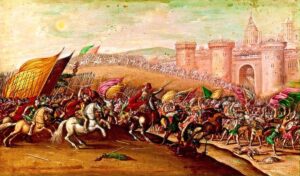The Maccabees
Alexander the Great, powerful king of the ancient Greek kingdom of Macedon,died in A.D. 323. Upon his death, four of his generals (Ptolemy, Antigonus, Cassander, and Seleucus) began their own dynasties, warring against each other for Alexander’s empire. Ptolemy secured Egypt and the land of Israel. For the next 125 years, Israel was sandwiched in the middle of two of these bitter rivals (the Ptolemies and the Seleucids). The Seleucids won in 198 B.C. with Antiochus III defeating the Egyptians and incorporating Judea into his empire. At first, he allowed the Jews to rule themselves, but when the Romans began to defeat the Seleucid empire, Antiochus III began to Hellenize the Jews, making them more like the Greek peoples. This meant they were to trade in their monotheism, belief in just Jehovah God, to the Greek’s polytheism, belief in many different gods. The Jews raised opposition at the threat of idols being introduced into their temples, and his son Antiochus IV, inheriting the throne in 176 B.C., fought back. We may know him better by the name Antiochus Epiphanes, meaning “god manifest.” With the Jews throwing a brief rebellion, he doubled down on his views, and outlawed some of the central tenets of Judaism, such as observing the Sabbath, and circumcision. He also had all copies of the Law of Moses that he could find burned. He also defiled the Temple by creating an altar to Zeus and sacrificing unclean animals (pigs), while also allowing non-Jews to worship there.
Many Jews were seduced by Hellenism, but when the king’s officer attempted to force a priest to sacrifice to a pagan god (Zeus), Mattathias the priest struck the Jew who was preparing the pagan sacrifice, and murdered the Greek official. In 167 B.C., the Jews united with Mattathias and his five sons to fight for their liberation. The sons names are John Gaddi, Simon Thassi, Judas Maccabeus, Eleazar Avaran, and Jonathan Apphus.
The family of Mattathias became known as the Maccabees, from the Hebrew word for “hammer.” The Jews refer to them as the Maccabees, but they are historically known as the Hasmoneans.They were said to strike great blows against their enemies, like a hammer. The home of Mattathias, Modi‘im (17 miles northwest of Jerusalem), became the center of resistance. Though the Jews first refused to fight on the Sabbath, and lost a thousand lives because of it, Mattathias insisted that all resisters should fight, even on the holy Sabbath. He then led a guerrilla warfare against Antiochus. Antiochus had at first underestimated the will and strength of this force, and only sent a small army to put down the rebellion. When that failed, he led a more powerful army, which also failed.
When Mattathias died, the revolt was led by Judas (often called Judah) Maccabee. By the end of the war, Simon Maccabee was the only one of the five Maccabean sons to survive. The Maccabees retook Jerusalem in 164 B.C., and purified the Temple, which gave birth to the Jewish holiday of Hanukah.
After more than two decades of fighting, the Maccabees forced the Seleucids to retreat from the Land of Israel. By this time, Antiochus had died, and the successor, Antiochus Eupater, was just a minor. Lysias, the general of the Syrians, agreed to allow the Jews their independence. He was dealing with fighting elsewhere, and gave the Jews liberty of conscience (belief) and worship. The Jews had been subjugated for over 500 years, but in the years 142 B.C., they once again gained independence. This lasted for 80 years, with the Hasmonean Kingdom ruling nearly as much land as Solomon. Jewish life flourished in this time. This was not the end of the war, however. It soon resumed, and Judas Maccabee sent a delegation to Rome to seek help. This marked the first step towards Rome eventually taking over the nation of Israel. After more than five years of leadership, Judas was killed in battle.
The Maccabees claimed the throne of Judah, but King Alexander Balas (also known as Alexander Epiphanes) called Jonathan Apphus “friend” and appointed him high priest in Jerusalem. This is in contradiction with the Old Testament which teaches only a descendant of Aaron may be high priest (e.g., Exo 28,Lev. 8:12). Because of this, the strict upholders of the Law created their own group, the conservative Pharisees. In time, rival factions developed and threatened the unity of the kingdom, with internal divisions and the appearance of another imperial power putting an end to Jewish independence in the land of Israel for almost 200 years.

